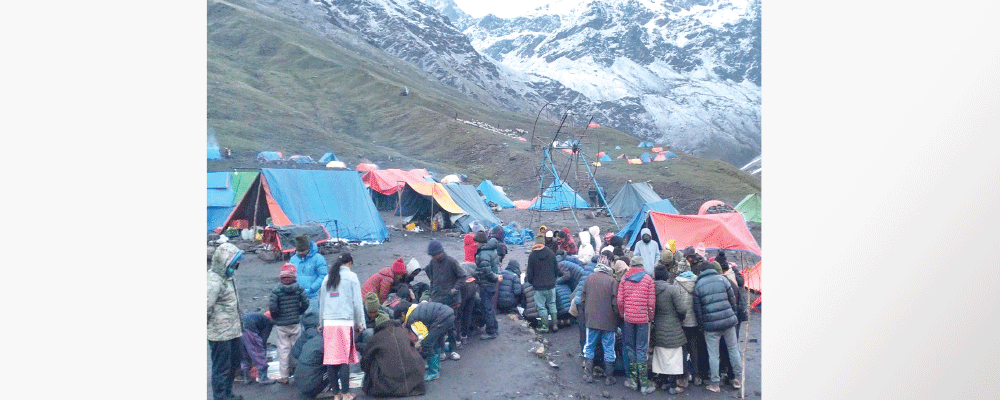
The annual production of Yarsagumba, a sought-after caterpillar fungus known for its medicinal properties, is experiencing a steady decline in the high pastures of Buki, triggering a significant surge in market prices.
Yarsagumba pickers have reported receiving favourable prices this year, but concerns arise over the dwindling annual yield.
The Yarsagumba pickers assert that the yearly yield of this medicinal herb in the high pastures of Buki, Puthauttarganga Rural Municipality, is experiencing a persistent decrease.
Yarsagumba is found in the highlands of Buki, encompassing wards 1, 2, and 3 of the rural municipality within the district. Yarsa pickers have reported receiving more favourable prices this year compared to previous years.
The locals of the rural municipality go to high pastures to harvest the world’s most expensive herb from April end and mid-July.
Yarsa collectors are pleased with the decent prices they are receiving. However, the annual production of Yarsagumba is dwindling in comparison to previous years, said Bikram Pun Magar, a ward member of Puthauttarganga-1.
He mentioned that this year’s yarsagumba harvest yielded approximately 26 to 30 kg. However, there has been a recent decline in production, with the quantity decreasing at a rate of about 10-11 kg per year.
“The decline in yarsagumba production can be attributed to two factors: climate change and the increase in garbage in the areas where yarsagumba is harvested,” said Magar.
These environmental changes have likely contributed to the reduction in the availability of yarsagumba, he added.
With the decline in yarsagumba production, it remains essential to address the environmental challenges and adopt sustainable practices to preserve this valuable medicinal herb in East Rukum, said Magar.
Birendra Budhamagar of Naukot Puthauttaranga-1 said yarsagumba was traded in the pasture land this year at a price ranging from Rs. 2.2 million to 2.8 million per kilogram.
Additionally, he mentioned that individual pieces of yarsagumba were sold for prices between Rs. 700 to 1500 rupees each, depending on their quality.
He said that in previous years, yarsagumba was sold at prices ranging from Rs. 500 to 1,200 per piece. But this year, even the standard quality of yarsagumba fetched a favorable price.
He said, “Yarsa pickers have received a good price for yarsa this year. The price they received was better than previous years,” he said adding, “This time each yarsa picker has earned at least Rs. 40,000 to 500,000 from Yarsa collection.”
Previously, yarsagumba collection was opened for individuals from different localities, including those from other districts. However, this year, there has been a policy shift, and only residents from the specific wards where yarsagumba is naturally found are permitted to harvest this medicinal herb.
The locals claimed that when outsiders are permitted to harvest yarsagumba, they leave litter scattered around and engage in uncontrolled digging. In response to these concerns, the local authorities have decided to ban individuals from other wards from collecting yarsagumba.
The locals have established a yarsagumba collection management committee, responsible for setting rules for yarsagumba harvesting annually. The committee has decided to levy a fee of Rs. 2,000 on each yarsagumba picker, while traders who buy yarsagumba are required to pay Rs. 10,000. These fees are implemented to regulate and manage the yarsagumba collection process within the area.
Chairman of the Puthauttarganga Rural Municipality, Puniraj Gharti Magar, said this year, 80 per cent of the fee collected by the committee was retained by the committee itself. The remaining 20 percent of the money was allocated to the rural municipality as revenue.
The funds retained by the committee would be utilised for various purposes, including social and physical development projects within the village, supporting school development, ensuring the security of yarsagumba, and managing other related activities, he added.
Bishwa KC, the ranger of the Division Forest Office, stated that this year, the office collected revenue of Rs. 31,000 per kilogram from yarsagumba traders.












